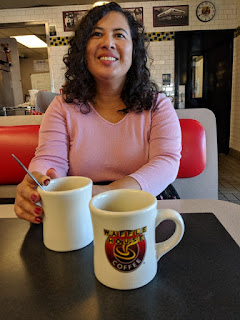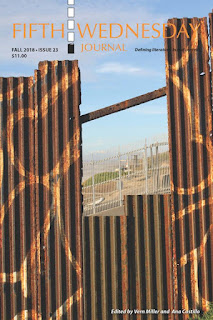
Before ringing in the New Year, I am taking advantage of the quiet everywhere to get some writing done. I realized only too late that I had not prepared a piece for this week's La Bloga. My New Year's Resolution will involve being better prepared and better organized. It's safe to say that a few of my husband's good habits have rubbed off on me. After ten years, I see the benefits of having less clutter and an organized closet. One change Steve has made in his life that I continue to resist is his decision to close his Facebook account for good. He has pointed out how FB has gotten rich over the concept of using people like me, people who regularly put up free content on a website that they get rich off of by selling my information and those of my 'friends' and reading my posts and messages and learning what I like and dislike and sharing that information with their advertisers. See the NYT article for 5 Ways Facebook Shared Your Data or yesterday's article which breaks down Facebook's rule book and how the company makes about $5 billion in profit per quarter thanks to our sweet posts and rants. The bottom line is Steve does not appreciate being used or manipulated and he values his privacy more than I do.
Earlier this month, La Bloga learned that Facebook had unblocked and restored all of our posts. Now, that have a platform again, I'm not eager to give it up. I suppose I can point to vanity of wanting to share that photo of me in Ireland or of me eating a fabulous meal or wearing a new dress that keeps me buying into the deal with the FB devil, all under the guise of being connected to over a thousand friends and of being a writer who will reach a bigger audience with this great deceit that we've all signed up for. In reality, every private message, every red heart or smiley face means data that the FB sells to other companies like Netflix and Yahoo. And if you think you're too savvy to fall into the traps of how FB is using you, think two words: President Trump. Sure, neither you nor I voted for the thing in white house, but a whole bunch of other people did and a whole election was stolen thanks to FB giving access to real and fake accounts in exchange for the product: you.
Before I was addicted to photographing my food and looking at random videos of people that I vaguely know, I viewed the internet as a source for useful essays and information that might help my writing. It was here on La Bloga, before I joined my fellow esteemed Blogueros, that began my day in anticipation of what I might find on La Bloga. After all, being a fan of Daniel Olivas's column led to my first published story, and eventually, my first published novel. I trust that there are still La Bloga readers who turn to our site before turning to the a highly curated website where users manipulate their reality and post what they want you to see. Better yet, I trust readers of La Bloga will choose to lose themselves in a book and wonder where the time went.
As 2018 comes to a close, I've published a a new poetry book, Bird Forgiveness (3: A Taos Press) two of the Bird Forgiveness poems were nominated for the Pushcart Prize. Readers of La Bloga know I've written several journalism and personal memoir pieces on La Bloga, as well as poems in literary journals, the most recent in Fifth Wednesday Journal, a special issue, Fall 2018 Issue 23, coedited by Ana Castillo and Vern Miller with cover art by Claudia D. Hernandez. La Bloga's own, Amelia Montes, contributed an excerpt from her upcoming memoir that was nominated for the Pushcart Prize. The call for Fifth Wednesday Journal's special issue on immigration was earlier this summer before the deaths of two children: Felipe Gomez Alonzo and Jakelin Caal. I also found out about the call for entries through a message on Facebook.














